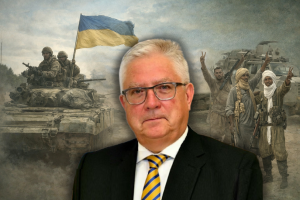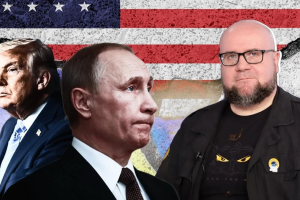This policy brief was prepared exclusively for "Rubryka"
International Developments
- China's Xi Jinping paid an official to moscow on 20-22 March.
During the visit Chairman Xi had official and unofficial meetings with the Russian president and prime minister, discussing geopolitical issues and economic and industrial cooperation. putin's grand expectations, especially in terms of China's political and military assistance to russian war efforts in Ukraine, were not reflected in the public results of the visit.
However, leaving practical cooperation between moscow and Beijing covered:
- China seemed to use the visit to camouflage its actual intentions to provide russia limited military assistance – according to remarks finalizing the visit, China and russia are not building any form of "military alliance", developing the existing political, economic and industrial cooperation.
- russia agreed to the general terms of the so-called Chinese "peace plan" on the political settlement of the russian-Ukrainian war – for the Chinese side, the "plan" is a vital instrument to cover military and political aid Beijing is covertly providing to russia.
- russia agreed to use Chinese national currency in its foreign trade operations with third countries to safeguard both sides from Western financial and economic sanctions.
China is using the war to achieve its geopolitical goals of (1) weakening the West as much as possible to (2) gain the most favorable negotiations position with the US and try to divide the US and the EU, and (3) put russia in the deepest possible political and economic dependence from China. The longer the war goes on without reaching a point of out-of-control escalation, the more China gets from it.
- russia's putin announced his decision to deploy tactical nuclear weapons to Belarus.
The decision is based upon exploiting the tactical ballistic missile complex "Iskander M" handed to Minsk in late 2022 and the modernized Soviet-era nuclear storage facilities in Belarus.
Lukashenko formalized the deal by removing Belarus' neutral and denuclearized status from the nation's constitution in the so-called "referendum" in February 2022, bringing russian nuclear-capable "Iskander M" to full combat readiness in December 2022.
The decision does not come as a surprise to the West, as moscow and Minsk have discussed it since at least the second half of 2020. russia viewed the possible move as an additional potential deterrent for the West not to interfere with the russian war against Ukraine.
The US has reacted to the russian move signalling its readiness to monitor any russian progress in preparations to use nuclear weapons and act accordingly.
The EU leadership condemned the kremlin's move as another threat to European security and announced its readiness to introduce additional sanctions against russia and Belarus.
Ukraine has called the UN Security Council emergency meeting to discuss russian dangerous nuclear blackmail escalation.
- The EU High Representative for Foreign Affairs and Security Policy Josep Borrell announced on March 20 that the EU member states agreed to deliver 1 billion of 155mm artillery ammunition rounds to Ukraine within the next 12 months.
The EU took a 3-track organizational/financial approach to the task:
(1) allocation of €1 bln from the European Peace Fund for immediate deliveries;
(2) allocation of additional €1 bln for joint procurement for 18 member states + Norway;
(3) reaching a joint agreement to ramp up production capacities.
If necessary, EU member states also agreed to allocate an additional €1.5 bln to boost the €2 bln project fund.
- US Army establishes permanent garrison in Poland.
USAG Poland will support three forward operating sites in Poland: FOS Poznan, FOS Powidz, and FOS Zagan, comprising 11 locations in Poland.
In addition to supporting the permanently assigned forces, USAG Poland will provide direct base operations support to roughly 4,000 rotational forces and 2,500 surge or exercise personnel.
The US Army Garrison Poland allows Washington:
- To meet strategic regional security requirements of the US Army in Europe and Africa.
- To improve command and control capabilities.
- To manage forward operating sites within the Republic of Poland.
Conclusions and Recommendations
- China's Xi Jinping visit creates a situation where russia seems to fall into even greater dependence on China. With late February – early March Belarus' Lukashenko visit to Beijing, PRC seems bound to build a cooperation model where russia is maximum dependent on China not only in economic, financial or industrial terms but also in terms of political and geopolitical issues.
russia is eventually about to play the role of a European 'North Korea' – an inadequate and aggressive nuclear power effectively under Beijing's control.
In this context, China will be able to play a power-broker role between russia and the West, using control over the escalation of the russian-Ukrainian war as a power advantage over the West.
In this situation, Ukraine should communicate its own "Just Peace" plan to China and persuade Beijing to recognize Kyiv as a key player in any peace settlement. It is necessary for Ukraine to prevent submission of the Chinese "peace plan" to the UN bodies as a working alternative to the Ukrainian proposal to end the war.
- putins' announcement to deploy tactical nuclear weapons to Belarus is a new move in the line of the traditional russian nuclear blackmail of the West.
However, the Western allies had time, resources and capabilities to be prepared to act accordingly. Two major joint military nuclear deterrence exercises held last year assure the NATO allies are prepared to deal with this phase of Russian nuclear blackmail escalation.
russia is prepared to step up its nuclear blackmail by implementing its long-sought plans to deploy tactical nuclear weapons to the occupied Ukrainian Crimea, the Arctic's High North and potentially one of its Middle-Eastern allies, with Syria being the most likely option. All this seems to be well orchestrated with China, which by contrast, would seem like the only reasonable power able to influence the current russian regime.
Ukraine should use the moment to press on Western allies to (1) get the ATACMS missile system to be ready to launch its major counteroffensive well before the Belarus nuclear weapons storage facilities become fully operational by the beginning of summer 2023 and (2) maintain even more pressure on russian and Belarus regimes.
- The EU decision to deliver 1 million of 155mm artillery ammunition rounds to Ukraine within the next 12 months marks a substantial shift in economic and industrial cooperation between the EU member states.
First, it follows the strategic course of Western allies to shift their national economies into the "war rails" to meet growing their own ad Ukrainian security demands.
Second, it assures the Ukrainian Armed Forces will not feel the lack of ammunition in the wake of the anticipated major counteroffensive.
Ukraine must exploit the moment to get as much military help as possible. At the same time, proposing our Western allies use the existing Ukrainian military-industrial potential remains the strategic security objective for the country.
- The establishment of the US Army permanent garrison in Poland comes in terms of the kremlin escalation of nuclear blackmail and further hybrid aggression against Western allies in an attempt to thwart Western military aid coming to Ukraine.
This move allows Washington to reiterate further its readiness to boost NATO joint defense capabilities and the defense of its Eastern flank in particular.
The move is also boosting Western efforts to provide military assistance to Ukraine. It guarantees more safety to logistics operations and provides additional capabilities to further safely maintain combat readiness of the equipment and weapon systems delivered to the Ukrainian military.
______________________________________
This policy brief was prepared exclusively for "Rubryka" as part of a project "russia-Ukraine Conflict: from Full-Scale War to Conflict Resolution and Post-War Reconstruction" implemented in cooperation with the Razumkov Centre with the support of the MATRA program of the Embassy of the Netherlands. The opinions expressed are those of the author(s) only and should not be considered as representative of the Embassy's official position.








